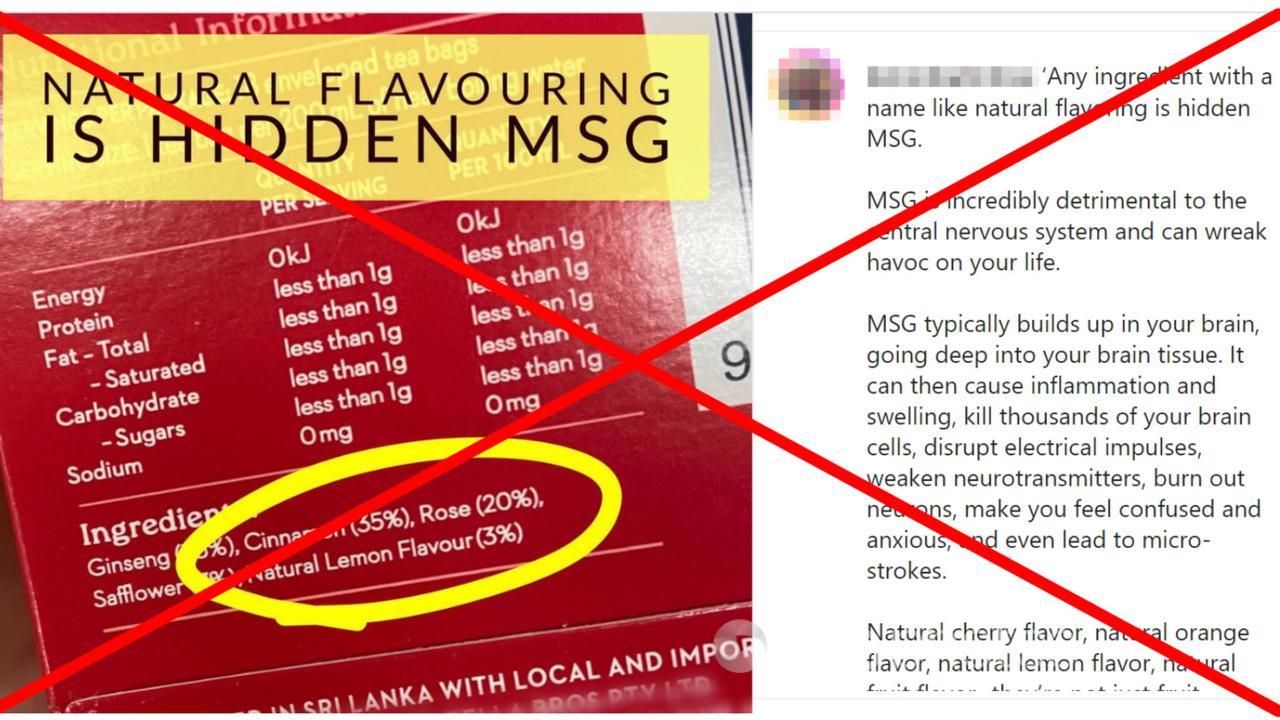Efforts by chefs and researchers to rehabilitate the image of the flavour enhancer MSG hasn’t stopped online misinformation, including claims it’s “detrimental to the central nervous system and can wreak havoc on your life”.
An Australian user’s Instagram post (screenshot here), which credits its information to an alternative medicine account with four million followers, makes startling claims about the food additive.
“MSG typically builds up in your brain, going deep into your brain tissue. It can then cause inflammation and swelling, kill thousands of your brain cells, disrupt electrical impulses, weaken neurotransmitters, burn out neurons, make you feel confused and anxious, and even lead to micro-strokes,” the post states.

However, food science experts say the claim is untrue, a view supported by research and various food safety authorities.
MSG is monosodium glutamate, which the US Food and Drug Administration explains is “the sodium salt of the common amino acid glutamic acid. Glutamic acid is naturally present in our bodies, and in many foods and food additives”.
Many people are familiar with MSG as the flavour enhancer used in some Chinese cuisine.
MSG’s unwarranted reputation began in 1968 with a single letter to the New England Journal of Medicine by Dr Robert Ho Man Kwok, who was reportedly a Chinese immigrant in the US who felt “numbness at the back of the neck, gradually radiating to both arms and the back, general weakness and palpitation” whenever he ate in American Chinese restaurants.
He suggested several culprits, including MSG. Several readers responded with their own experiences.
Concerns about MSG have persisted despite doubts about the letter’s authorship, as outlined in this expose from Colgate University in the US, followed by even more doubt cast on the veracity of the expose itself in an episode of the podcast This American Life.
Despite questions about the letter’s authorship, what has been dubbed “Chinese Restaurant Syndrome” has persisted, with suggestions it may be racially motivated.
But as an SBS investigation points out, some people do occasionally experience mild problems after eating MSG.
The Food Standards Australia New Zealand (FSANZ) website says: “A small number of people may experience a mild hypersensitivity-type reaction to large amounts of MSG when eaten in a single meal. Reactions vary from person to person but may include headaches, numbness/tingling, flushing, muscle tightness, and general weakness. These reactions normally pass quickly and do not produce any long-lasting effects.”
But MSG does not kill brain cells and damage the nervous system.
“MSG is considered safe and is an authorised food additive in the EU and Australia and New Zealand,” FSANZ says.
Tamara Bucher, a senior lecturer with the School of Environment and Life Sciences at the University of Newcastle, told AAP FactCheck the Instagram post’s claim is false.
Dr Bucher pointed to a 2019 systematic review of experimental studies which showed the reported negative health effects of MSG had little relevance for chronic human exposure to low doses.
“There is a controversy around MSG, but based on this and other review studies, it seems unlikely that normal dietary intakes of MSG cause health problems in humans,” she said in an email.
“Contrary to consumer perceptions, food additives are generally safe and are usually added to make food products safer and more palatable for human consumption.”
Dr Bucher’s view is supported by government food authorities, such as the FDA, which says adding MSG to foods is “generally recognised as safe”.
“Although many people identify themselves as sensitive to MSG, in studies with such individuals given MSG or a placebo, scientists have not been able to consistently trigger reactions,” the FDA says.

NZ’s Ministry of Primary Industries says MSG is harmless to most people even when eaten in large quantities, with most servings being around half a gram and a large serving as much as three grams.
However, the ministry acknowledges some people may have a sensitivity to MSG, saying those “with severe or poorly controlled asthma may also be susceptible”.
Symptoms of sensitivity can include headaches, flushed or burning feelings around the neck and chest, nausea, rapid heartbeat and difficulty breathing.
The NSW Food Authority website says MSG is one of the most extensively researched substances in the food supply and has been studied for more than 40 years. It quotes the FSANZ following a review of the safety of MSG in 2003 to say “there is no convincing evidence that MSG is a significant factor in causing systemic reactions resulting in severe illness or mortality”.
Dietitian Anika Rouf also told AAP FactCheck that MSG is safe to consume, but she acknowledged some people can experience a hypersensitivity.
“Like many food intolerances, the level of MSG that a person can consume before experiencing symptoms can vary,” Dr Rouf said in an email.
She says anyone experiencing problems should consult a GP or accredited practising dietitian.
Similar claims about MSG have been debunked here, here, here and here.
The Verdict
The claim MSG kills brain cells and damages the nervous system is false. Concerns about a link between MSG and some physical symptoms have been traced to a letter to a medical journal in 1968, which itself has been disputed.
Food safety authorities, scientific studies and experts say MSG is safe to consume.
False – The claim is inaccurate.
* AAP FactCheck is an accredited member of the International Fact-Checking Network. To keep up with our latest fact checks, follow us on Facebook, Twitter and Instagram.
All information, text and images included on the AAP Websites is for personal use only and may not be re-written, copied, re-sold or re-distributed, framed, linked, shared onto social media or otherwise used whether for compensation of any kind or not, unless you have the prior written permission of AAP. For more information, please refer to our standard terms and conditions.


















